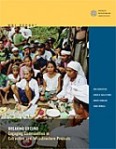Just by coincidence, I learned about how “controversy swirls around harsh anti-obesity ads” in Georgia, part of a five-year, $25 million anti-obesity effort and hosted at strong4life.com. Then I read about a consultant explaining to board members of the Natural Resources Defense Council being told: “Environmentalists were always yammering to consumers about the back of the box. And, guess what? Nobody wants to listen.”
We better start reading the back of the brownie box to deal with obesity…and the back of energy bills, land lease agreements, environmental regulation and other fine print so we can begin to figure out how we get by in a world of limited resources. The NYT article, Environmentalists Get Down to Earth, gets me re-engaged. But what if the consultant is right and we don’t want to listen to the truth about complex problems that are too hard to solve today and are not the priority for the short-term?
The solution presented in the article are bite-size and fit on the front of the box:
- Fight global warming by focusing on immediate, local concerns;
- Reinvigorate the grass roots through social media and street protests; and
- Renew an emphasis on influencing elections.
Those don’t do it for me. First, if everyone goes local, nobody is thinking about the bigger picture. Issues about sustainability are not going to fit into small manageable boxes with tags about “economy and jobs”, “environmental protection” and “energy security”. This is very apparent in another NYT article on the boom impacts of a New York county benefitting from gas drilling in neighboring Pennsylvania. And one NYT editor actually highlighted the paper’s own inability to see the “big picture” of shale gas as one of the key issues requiring more effort on the part of the paper itself.
Social media has some strengths and weaknesses. Attracting new interest is great, but if we make our political choices as easily as we can “like” a new cause that we know little or nothing about, we won’t be having any serious debate soon. It takes more back-of-the-box reading.
A renewed emphasis on elections seems right, if not glaringly obvious with the upcoming US election, but this renewed emphasis has to be through informed debate. Since starting to work in sustainability, I have become very sensitive to the half-truth and only telling part of the story. I can only hope people will demand more.
I liked the Georgia campaign and think it serves as a good example for other groups. I thought the commercials were direct and made an impression. But they don’t seem to tell me what to think. I obviously need to look further. I wish more commercials about the environment (from anti- and pro- sides) pulled me to their sites where I could see the headings “learn”, “ask” and “get started”, rather than bashing me over the head with the obvious answer.
